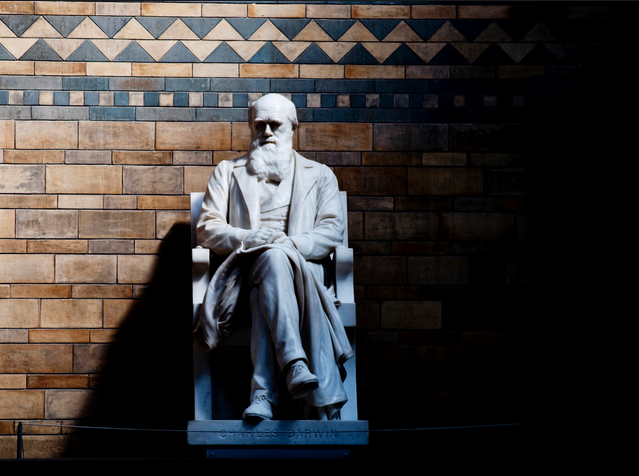(单词翻译:单击)
Darwin kept his theory to himself because he well knew the storm it would cause. In 1844, the year he locked his notes away, a book called Vestiges of the Natural History of Creation roused much of the thinking world to fury by suggesting that humans might have evolved from lesser primates without the assistance of a divine creator. Anticipating the outcry, the author had taken careful steps to conceal his identity, which he kept a secret from even his closest friends for the next forty years. Some wondered if Darwin himself might be the author. Others suspected Prince Albert. In fact, the author was a successful and generally unassuming Scottish publisher named Robert Chambers whose reluctance to reveal himself had a practical dimension as well as a personal one: his firm was a leading publisher of Bibles.
达尔文没有把他的理论公之于世,殴为他太清楚这将会对社会产生怎样的震撼了。在1844年,在达尔文把手稿锁进抽屉里的那一年,有一本名为《创造的自然史之残迹》激起了思想界的勃然大怒,因为它提出人类可能是从比较低等的灵长类动物进化而来的,在此过程中没有得到创造世界的神灵的帮助。作者事先估计到会掀起轩然大波,便十分小心地将自己的身份隐匿起来。这个秘密保守了40年之久,连他最亲近的朋友也不知道。有的人猜测作者可能是达尔文,有的人怀疑是阿尔伯特亲王。实际上,作者是一位成功而又不事张扬的苏格兰出版商,他的名字叫罗伯特·钱伯斯,他不愿意暴露自己有其实际的以及个人的考虑:他经营的是一家专门出版《圣经》的著名公司。
Vestiges was warmly blasted from pulpits throughout Britain and far beyond, but also attracted a good deal of more scholarly ire. The Edinburgh Review devoted nearly an entire issue — eighty-five pages — to pulling it to pieces. Even T. H. Huxley, a believer in evolution, attacked the book with some venom, unaware that the author was a friend. (Darwin was one of the few to guess correctly. He happened to be visiting Chambers one day when an advance copy of the sixth edition of Vestiges was delivered. The keenness with which Chambers checked the revisions was something of a giveaway, though it appears the two men did not discuss it.)
《残迹》不仅受到国内外宗教人士的抨击,也饱受众多学术界人士的批判。《爱丁堡评论》用了将近整整一期的篇幅——长达85页——将它批得体无完肤。连进化论的拥护者T.H.赫胥黎也对这本书进行了猛烈的抨击,可是他一点儿也没有意识到,该书的作者是他的一位朋友。(注:达尔文是仅有的几位猜测正确的人之一。达尔文碰巧在《创造的自然史之残迹》第6版样书到达的那一天拜访钱伯斯。尽管两人似乎并没有谈起此书,但是钱伯斯检查样书时的专注神情无意间泄露了他内心的秘密。)


